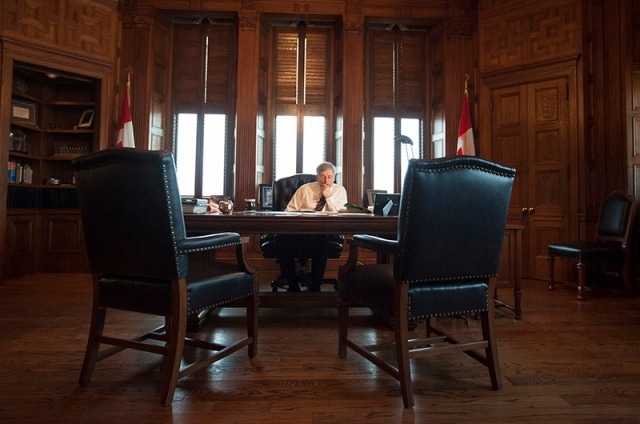At an estimated 2,700 litres, the bunker fuel spill in English Bay was relatively small — yet the stakes of that spill couldn’t be much higher.
With Enbridge and Kinder Morgan both hoping to build oil pipelines to B.C., which would significantly increase oil tanker traffic in the province’s inside coastal waters, a dramatically mishandled marine oil spill raises all sorts of questions — questions the federal government does not appear well-positioned to answer, despite its aggressive push for West Coast oil exports.
“Obviously, from the oil industry’s perspective, you couldn’t have picked a worse place to have an oil spill,” Jim Stanford, economist at Unifor and founder of the Progressive Economics Forum, told DeSmog Canada.
While the federal government insisted its response was “world-class,” a former commander of the shuttered Kits Coast Guard station blamed the six-hour delay in even deploying a boom to contain the oil on the closure of that station in 2013 — a move that is reported to have saved the federal government at estimated $700,000 a year.
The English Bay spill, beyond being a systemic failure, has been a total PR disaster.
“It’s a very dramatic indication of the failure of our environmental safeguards around transportation and energy,” Stanford said.
Will The Real Energy Superpower Please Stand Up
Canada’s aggressive “energy superpower” push — a Harper government priority that has been accompanied by the elimination of environmental laws— has drawn criticism from all corners, and not just domestically.
The Obama administration indicated the fate of TransCanada’s Keystone XL pipeline, which has been caught in a protracted review process for six years, was intrinsically tied up with the oilsands’ growing greenhouse gas emissions. The European Union came close to labelling oilsand’s crude as high-carbon due to its energy-intensive extraction and refining process (that move was thwarted by intensive lobbying by the Canadian and Albertan governments).
Back at home, the undercutting of environmental reviews and elimination of environmental laws has resulting in growing citizen concern about Canada’s oilsands development and record on climate change, as demonstrated by recent climate and pipeline protests.
Martha Hall Findlay, former Liberal MP and executive fellow at the University of Calgary’s School of Public Policy, says the federal government has blown the environmental file.
“You don’t poke people in the eye when the rest of the world is saying there are significant environmental concerns,” she said.
“I think it’s smart to acknowledge that and address it. Our current federal government has done the opposite in many ways. And, importantly, have been seen to be doing the opposite. There’s no doubt in anyone’s mind that it was a factor in Obama’s decision on Keystone.”
With Friends Like These Who Needs Protesters?
What’s become clearer is that such a myopic approach to policymaking has created difficult conditions for the extractive industries.
“The Harper government’s bloody-mindedness on environmental issues has actually done more to bog down large resource projects than anything the environmental movement could have done,” Rick Smith, executive director of the Broadbent Institute, said.
“What it’s done is make First Nations, local communities and environmentalists feel marginalized and angry.”
Keith Stewart of Greenpeace Canada echoed the sentiment, saying complaints are now likely to emerge from beyond the protest crowd: “If the government won’t listen to Canadians about it, they’re soon going to have to listen to our would-be customers.”
While there’s some significant progress occurring on the provincial front on the climate change file, that can’t make up for the lack of federal leadership.
“People outside Canada don’t necessarily understand the nuances of the different levels of governance within the country,” notes Anthony Heyes, University of Ottawa economics professor and Canada Research Chair in Environmental Economics. “Outsiders see it as a country that has a relatively disappointing record in not just greenhouse gas emissions in an absolute way, but also against international commitments..”
Hall Findlay added that if the federal government had followed the lead of the provinces, Keystone XL might have been approved. But at this point, piecemeal climate commitments from the provinces might not be enough.
An associated problem is the fact that Harper bet the economy on the success of the oil and gas sector (Thomas Walkom put it nicely in a piece for the Toronto Star: “Harper has his own unspoken industrial policy. It can be summed up in a word: pipelines.”)
Stanford suggests that such infatuation has come at the cost of other industries — manufacturing, tourism, transportation — due to the high dollar being pegged to an extremely volatile resource.
“You would have needed a government with the foresight and courage to actively push against that in order to protect our environment, obviously, but also our economic diversity and long-run prosperity instead of riding the bandwagon as they did,” he said.
Stanford notes that the employment rate is currently as low as it was in the summer of 2009, the worst moment of the global recession. That’s got to sting for a party that advertises its leader as a trained economist — not an elitist lawyer or under-qualified teacher.
Ultimately, Harper’s mismanagement of the energy and environment file — and most importantly the nexus of those two things — might be more of a gift than a burden for those who want to see progress on climate change.
“In a way, the fact that Stephen Harper has burned any semblance of federal environmental regulation to the ground is an opportunity for Canadians to rebuild something at the federal level that’s new, truly modern and forward thinking,” Smith says.
Subscribe to our newsletter
Stay up to date with DeSmog news and alerts







